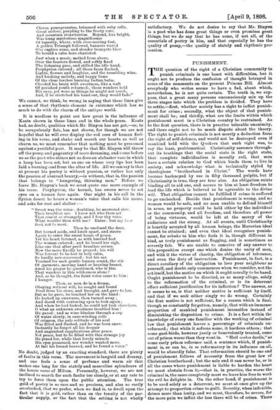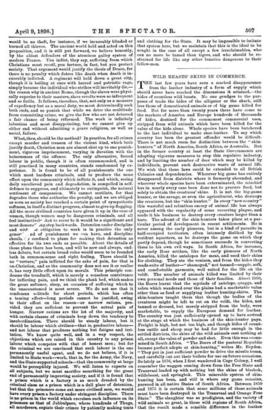PUNISHMENT.
THE question of the right of a Christian community to punish criminals is one beset with difficulties, but it
ought not to produce the confusion of thought betrayed in some of the comments on the present Prisons Bill. Almost everybody who writes seems to have a fad, about which, nevertheless, he is not quite certain. The truth is, we sup- pose, that a great many persons unconsciously mix up the three stages into which the problem is divided. They have to settle,—first, whether society has a right to inflict punish- ment for crime ; secondly, what the object of that punish- ment shall be; and thirdly, what are the limits within which punishment must in a Christian country be restrained. As to the first question, there is in practice tolerable unanimity, and there ought not to be much dispute about the theory.
The right to punish criminals is not merely a deduction from the right of self-defence, and would not be destroyed even if mankind held with the Quakers that such right was, to say the least, problematical. Christianity assumes through- out its teachings that the social state is the right state, that complete individualism is morally evil, that men have a certain relation to God which binds them to live in society, and acknowledge what is technically styled by theologians "brotherhood in Christ." The words have become hackneyed by use in fifty thousand pulpits, but if Christianity is true, they are true also. An obligation exists binding all to aid one, and secure to him at least freedom to lead the life which is believed to be agreeable to the divine will. That obligation cannot be fulfilled if crime is suffered to go unchecked. Decide that punishment is wrong, and no woman would be safe, and no man unable to defend himself in arms, no property could be held either by the individual or the community, and all freedom, and therefore all power of being virtuous, would be left at the mercy of the audacious and the strong. At all events, until Christianity is heartily accepted by all human beings, the Moravian ideal cannot be attained; and even that ideal recognises punish- ment, for rebuke to him who feels it is, though different in kind, as truly punishment as flogging, and is sometimes as severely felt. We are unable to conceive of any answer to this proposition except one which denies the unity of man, and with it the virtue of charity, the obligation of tolerance, and even the duty of instruction. Punishment, in fact, is a direct corollary of the obligation to love your neighbour as yourself, and doubt only commences when we consider, not the act itself, but the motive on which it ought morally to be based. Ought punishment to be directed, as so many allege, solely to the reformation of the criminal, or is its deterrent effect sufficient justification for its infliction P The answer, as it seems to us, is that neither motive is sufficient by itself, and that if we seek either singly we do wrong. Certainly the first motive is not sufficient, for a reason which is final, though so constantly forgotten, namely, that with an immense proportion of mankind punishment intensifies instead of diminishing the disposition to crime. It is a fact within the knowledge of every one familiar with the working of criminal law that punishment leaves a percentage of criminals un- reformed; that while it softens some, it hardens others ; that some gaol-birds, however justly or benevolently treated, come
out of prison worse than they went in. "Hell snakes devils," as some early prison reformer said, a sentence which, if punish- ment is, or can be, in as reformatory in its influence on all,
would be absurdly false. That reformation should be one end of punishment follows of necessity from the great law of Christian brotherhood ; but the sole end it can never be, or in all the cases where punishment is liable to harden the heart we must abstain from it,—that is, in practice, the worse the criminal is, the more completely must we leave him free to work the evil he delights in. On the other hand, if punishment is to be used solely as a deterrent, we must at once give up the attempt to proportion crime to guilt. Severity, when inflexible,
deters more than lenity, and we must, therefore, be severe, for the more pain we inflict the less there will be of crime. There
would be no theft, for instance, if we inexorably blinded or burned all thieves. The ancient world held and acted on this proposition, and it is still put forward, we believe honestly, by the ablest defenders of the atrocious galley system of modern France. You inffict, they say, suffering from which Christians must recoil, you torture, in fact, but you protect society. That argument would justify the thesis of Draco, for there is no penalty which deters like death when death is in- exorably inflicted. A regiment will hold down a great city, though it is boiling at once with hatred and patriotic rage, simply because the individual who strikes will inevitably die,— the reason why in ancient Rome, though the slaves were physi- cally superior to their masters, slave revolts were so infrequent and so futile. It follows, therefore, that, not only as a measure of expediency but as a moral duty, we must determinedly seek both ends, and so punish that while we deter the multitude from committing crime, we give the few who are not deterred a fair chance of being rbformed. The work is infinitely laborious and most disappointing, but we cannot give up either end without admitting a grave religious, as well as social, failure.
What, then, should be the method? In practice, for all crimes except murder and treason of the violent kind, which both justify death, Christian men are almost shut up to one punish- ment, rigorous imprisonment, varying in duration with the heinousness of the offence. The only alternative, forced labour in public, though it is often recommended, and is still practised in many countries, stands condemned by ex- perience. It is found to be of all punishments the one which most hardens criminals, and to produce the same effect upon the community which inflicts it, and which, seeing daily unrelieved pain and degradation, is compelled in self- defence to suppress, and ultimately to extinguish, the natural sentiment of compassion. We cannot mutilate, for that degrades those who authorise the penalty, and we are obliged as soon as society has reached a certain point of sympathetic softness, in itself a distinct progress, almost to give up flogging. All the more civilised countries have given it up in the case of women, though women may be dangerous criminals, and all feel instinctivel,- .,hat to recur to it would be a significant and most demora'• .ng step backwards. Detention under discipline and with A obligation to work is in practice the only gener-- nd of punishment we 'au have, and discipline shoulck e. confined to plans for making that detention as effective for its two ends as possible. About the details of those plans there has been, and will be now and always, end- less debate, but certain broad rules would seem to be founded both in common-sense and right feeling. There should be no "torture," pain inflicted for the sake of pain, for that is tm-Christian, and as the community does not see it or realise it, has very little effect upon its morals. This principle con- demns the treadmill, which is merely a senseless contrivance for inflicting pain, and we think the plank bed, which makes the great softener, sleep, an occasion of suffering which to the unaccustomed is most severe. We do not see that it condemns solitude for short periods, which has often a taming effect—long periods cannot be justified, owing to their effect on the reason—or narrow rations, pro- vided they are sufficient to prevent the actual pain of hunger. Narrow rations are the lot of the majority, and with certain classes of criminals keep down the tendency to insubordination. There should be steady labour, but it should be labour which civilises—that is, productive labour— and not labour that produces nothing but fatigue and irri- tation. We know quite well, and in a way respect, the objections which are raised in this country to any prison labour which competes with that of honest men ; but for the criminal we are convinced that such labour is the one Permanently useful agent, and we do not believe, if it is limited to State work—work, that is, for the Army, the Navy, and the State-supported schools—that the community at large would be perceptibly injured. We will listen to experts on all subjects, but we must sacrifice something for the great end of permanently improving society, and if it is found that a prison which is a factory is as much dreaded by the criminal class as a prison which is a dull place of detention, but that the prisoners come out more civilised men, we would have every prison a factory under stringent discipline. There is no prison in the world which exercises such influence on its Prisoners as that of Jubbnlpore, where hundreds of Thugs, all murderers, expiate their crimes by patiently making tents
and clothing for the State. It may be impossible to imitate that system here, but we maintain that this is the ideal to be sought in the case of all except a few irreclaimables, who can no more be tamed than tigers, and who should be re- strained for life like any other lunatics dangerous to their fellow-men.



































 Previous page
Previous page